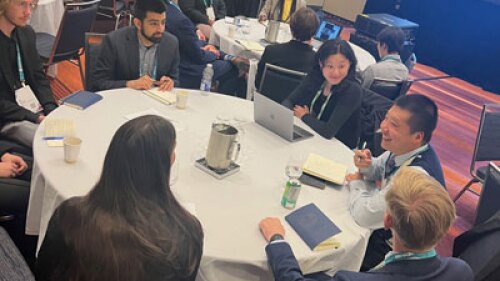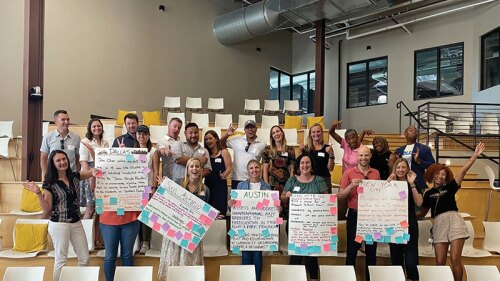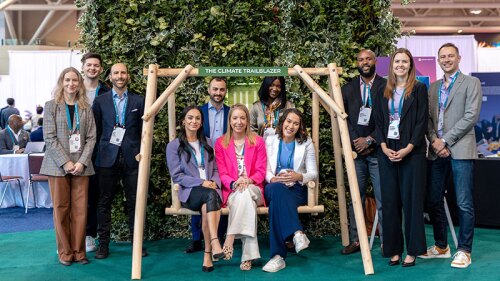ULI is only as great as its members, and our success is driven by the ability to listen to members and understand their needs. Under ULI Americas Chairman Trish Healy’s leadership, the Americas Executive Committee is taking this task quite seriously.
The work of the Americas leadership and executive committee comes at a time of exciting growth for the Institute. Last fiscal year, ULI’s membership grew by nearly 10 percent, capping a three-year upward trajectory of growth in the three global regions—the Americas, the Asia Pacific region, and Europe.
While ULI is becoming more global, it is simultaneously becoming more locally and regionally focused. To guarantee that ULI remains a member-centric organization, the ULI Global Board of Directors created a leadership structure with three chairmen, chief executive officers, and executive committees representing members in the Americas, Asia Pacific, and European regions. The task of each region’s leadership is to ensure that the Institute is responsive to and reflects the priorities of the regional membership while strengthening connections to members around the world.
The Americas Executive Committee has prioritized gaining a clearer understanding of the state of the Institute in the Americas and the needs of the Americas-based membership. Healy and the 17-person committee are spearheading efforts to understand how to increase ULI’s value to members, how to better leverage member talents to further the Institute’s mission, and how to prioritize and measure the work of the Americas in advancing the mission of leadership in the responsible use of land.
Americas Chief Executive Officer Jeanne Myerson is working closely with the committee to increase transparency between ULI’s content centers and the District and Product Council Network to unlock additional opportunities for members to learn, lead, network, and serve.
“The first thing we want to say to our members in the Americas is that you have a voice,” said Healy, principal at the Raleigh, North Carolina–based Hyde Street Holdings. “Our goal is to get closer to the members, listen to you, and curate your feedback. We want to better understand how ULI’s work can be beneficial to you and even more meaningful to our built environment.”
Since its appointment in June, the committee has been soliciting feedback from members in both formal and informal ways. In the week leading up to the 2016 ULI Fall Meeting in Dallas, and during the meeting itself, the committee surveyed the 30,000-plus Americas membership. From the responses of more than 1,400 members—a combination of virtual responses and Fall Meeting attendees—the committee has learned the following:
- Members want ULI’s content to be more accessible and user-friendly. They want the Institute’s content to be centrally aggregated and easier to search.
- Members want the impact of ULI’s activities and content to be more measurable and to communicate this impact more effectively. They want the Institute to make a measurable difference in their communities while also providing practical information that they can apply to their businesses.
- Members want to be connected to leadership and engagement opportunities. They value the leadership and volunteer opportunities that ULI has to offer, and want the Institute to better match their interests and experiences with learning opportunities and leadership positions.
- Members want ULI to invest in the future generation of ULI leaders. ULI needs to engage and retain the next generation of members by mentoring them, providing them with leadership positions, and considering how to ease the financial burdens of membership.
- Members want to share best practices and “lessons learned” across member networks. ULI needs to invest in toolkits and other resources for district and product councils to further develop member-to-member connectivity and to deliver more powerful programming.
Download Member Survey Results
Increasing Engagement
“One of the key takeaways from the survey is: members want even more engagement,” said Bret Wilkerson, managing director of the Austin, Texas-based Hawkeye Partners and the Americas executive committee member who oversaw the development of the survey. “We’re talking about a few things: ease of involvement, leadership development, and making transparent the opportunities for member involvement such as governance roles and programming.”
“Members see their ULI engagement as a way to gain insight and knowledge to advance their own careers, while also advancing the state of the industry,” Wilkerson said. “Members want the practical day-to-day knowledge while also leveraging their skills to make a positive impact.”
Building Bridges
ULI is often described as being a “big tent” where professionals across the spectrum of land use disciplines and at various career stages gather. Product councils were once one of the few ways to craft a more intimate experience within the big tent, but now members can customize their experience through additional networks, including the District Council Network, local product councils, the Young Leaders Group, the Women’s Leadership Initiative, and the ULI NEXT Global group.
At the same time, the Institute’s content centers such as the Terwilliger Center for Housing, the Center for Sustainability, and the Building Healthy Places Initiative highlight best practices and case studies for integrating housing affordability, sustainability, and human health into land use planning and real estate development decision making. Connecting that work to smart financial and land use planning on behalf of ULI’s many constituencies is another area on which the committee is focused.
“We have so many resources, in human capital—trustees, former trustees, product and district council leaders; we have financial resources—not just of ULI, but our partners—and we have valuable information coming out of our content areas and our networks,” Healy said. “We must find a way to connect it all together to make a more measurable impact.”
Increasing Transparency
The ULI Americas Executive Committee and staff are also working toward making the Institute more transparent and user-friendly, harnessing the power of technology. New digital tools such as the ULI Leadership Navigator and a redesigned website will directly connect members to leadership and service opportunities across the entire global organization.
“Transparency and technology are critical components of connecting our members with enriching experiences, demonstrating the value of membership, and delivering meaningful programs that create positive change in communities,” Myerson said. “Part of our work now is to strengthen pathways for members to make the most impact and remove barriers for them to be engaged, lead, and serve.”
Trustees and Alumni Trustees: Tapping into—and Recognizing—Their Talents
Trustees and alumni trustees—former trustees who are interested in staying engaged with ULI—are another group that the committee has been actively engaged with in its reassessment of member value. During the 2016 ULI Fall Meeting in Dallas, trustee and alumni trustee roundtables were held to understand how the Institute can better meet their needs.
Lizanne Galbreath, managing partner of the Norwalk, Connecticut–based Galbreath and Company and the committee member who led the roundtables, said that trustees and alumni trustees are seeking deeper engagement with ULI and more value from their membership, in turn. One response to this concern could be more targeted outreach and recruitment of trustees and alumni trustees to serve as mentors or advisers, speakers and experts at forums, and panelists on Advisory Services panels or jurors for ULI awards program. Galbreath, along with other committee members, is working diligently to develop ideas to present at the midwinter trustees’ meeting in January.
Alumni trustees, in particular, feel they have much more to give even after their trustee term is complete. “Just because you’ve finished your term does not mean your engagement and leadership with ULI should stop,” Galbreath said. “We need to keep this group engaged and keep them feeling valued and important.”
Next Steps
Since Dallas, the committee has been developing a new strategic plan for the Americas, which it will debut at the 2017 ULI Fall Meeting in Los Angeles. Taskforces and working groups have been set up to work on various aspects of the plan. Updates will be provided to Americas members after key leadership meetings of the upcoming year. “In the interim, ULI will continue to provide members and their communities the opportunities and research insights they expect from ULI,” Myerson said.
“While the Americas Executive Committee is continuing to work with its counterparts in other regions to ensure consistency of the ULI brand, we are also on a parallel path towards ensuring we deliver a ULI that is more reflective of our members and the future demands of the Americas region,” Healy said. “It is a busy time in ULI Americas.”




